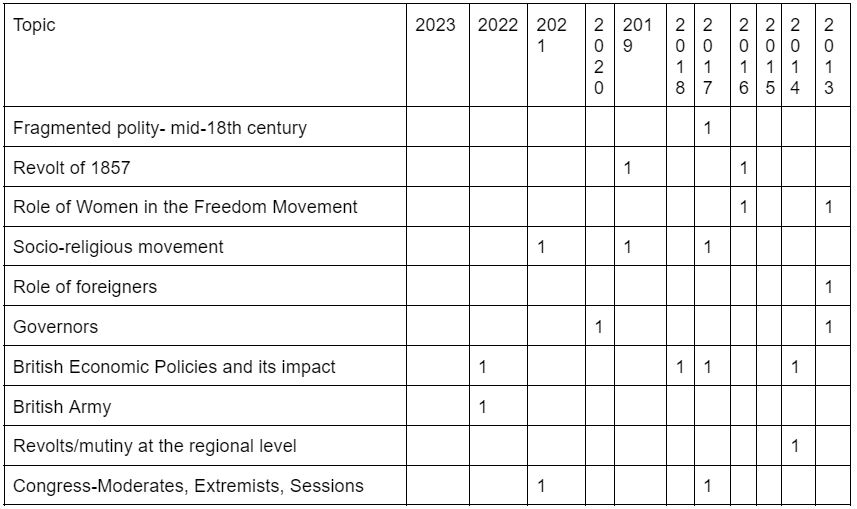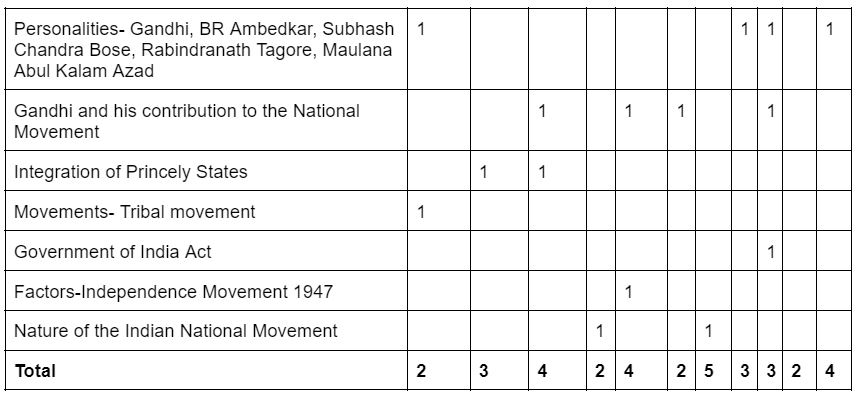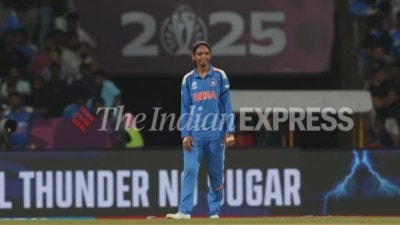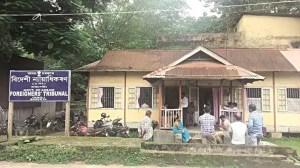
Where do we find the Indian National Movement in the UPSC Syllabus?
Prelims: The History of India and the Indian National Movement.
Mains: General Studies I: The Freedom Struggle — its various stages and important contributors/contributions from different parts of the country.
Micro topics: Revolt of 1857, Growth of nationalism in India (1858-1905), Socio-religious movement, Formation of Indian National Congress, Moderates & Extremists, Militant nationalism, Beginning of mass nationalism (1919-1939), Role of Mahatma Gandhi and other leaders, Non-cooperation movement, Civil Disobedience Movement, Quit India Movement, Government of India Acts, Role of Governors, Movements- Peasant, tribal, princely states, sepoy; factors leading to partition and independence, integration of princely states, and nature of Indian Independence struggle.
Let’s see the trend…
What has been the weightage of the ‘Freedom Struggle’ topic in the History section of UPSC Mains exam over the years (2013-2023)?

Topic-wise analysis of the previous year’s questions asked by UPSC


Story continues below this ad
What the above tables tell us – 9 key takeaways
1. A comprehensive analysis shows that the frequency of questions from Indian Independence Movements has been between 3 and 5. Consequently, a strong preparation in this area will ensure the ability to tackle any question thrown in this direction.
2. Examining the trend of the questions, the UPSC has consistently focused on certain key areas – the role of Mahatma Gandhi in the National Movement, the political, social, and economic ideas of important personalities of our national movement – both foreign and Indian, British economic policies and its impact, and the socio-religious reform movements in pre-independence India.
3. UPSC has been significantly emphasising on topics related to the National movement since a long time. Especially over the past decade, there has been a repetition of questions from this particular part of the syllabus. For instance, in 2012, UPSC posed a question on the ideological evolution of the national movement and a somewhat similar question has been asked in 2020 as well
4. Questions on the economic impact of colonialism have also appeared several times. In recent years, the examination has also begun to address newer aspects of this theme. For example, in 2018, a question on indentured labour and its impact during the colonial period was asked, marking the first time this topic was covered. Before that, the UPSC had asked questions about the decline of artisans, the decline of the textile and small cottage industries, and the drain of wealth.
Story continues below this ad
5. ‘Governor Generals’ is another frequently asked topic. The UPSC has asked questions about Lord Lytton, Lord Ripon, Lord Curzon, and Lord Dalhousie. Notably, in 2010, the UPSC featured a question on Lord Dalhousie’s annexation policy, and on a similar line, another question on Dalhousie had been asked in 2013.
6. In terms of contributions by important personalities, UPSC has asked about the evaluation of the contribution of Subhash Chandra Bose to India’s freedom. In 2016, it asked a comparative question between the approaches to the freedom struggle by Subhash Chandra Bose and Mahatma Gandhi.
7. The socio-religious reform movements and their contribution to Indian nationalism have also been a focal point in the mains examination. Questions have been asked about the Ramakrishna Mission, Theosophical society, Arya Samaj as well as the overall character of these movements. This makes the section particularly important for aspirants. One should be well-versed with the contributions of Swami Vivekanand, Raja Ram Mohan Roy, Dayanand Saraswati, and Ishwar Chandra Vidyasagar. In 1984, UPSC asked a question about the 19th century as a period of the ‘Indian Renaissance’. There have been recurrent questions on this topic in 2006 and 2019.
8. Mahatma Gandhi and his contribution to the National movement have been consistently asked by UPSC over the years. The pattern of questions has been simple. In recent times, UPSC has started asking questions that require an overall understanding of the topic. In terms of comparison with other personalities like Rabindranath Tagore and Jawaharlal Nehru, the most common areas are – Education, Nationalism, Economy, Social.
Story continues below this ad
9. Questions regarding proposals leading to Indian independence have been notably absent in recent examinations. Historically, the UPSC has addressed topics such as the Cripps Mission, the Mountbatten Plan, the Cabinet Mission, and the C. R. Formula.
So what…
The Freedom Struggle — its various stages and important contributors/contributions from different parts of the country is a comprehensive topic requiring the ability to connect historical events with broader themes. The questions themselves present a dynamic challenge to aspirants to focus on critical analysis and conceptual clarity. It is also important from the perspective of prelims as well.
The purpose of this trend analysis is to help you realign your preparation on this, for better navigation and enhancing chances of success in the exam. You now know which are the important areas that should be the focus. But, it does not mean other sections are irrelevant. UPSC loves to surprise students. It is better to be prepared for a section where you can be sure. Gear up for your preparation, solve as many previous years questions as you can. Remember, in this section you can easily score good marks and must not overlook it.
Happy Independence Day!





































